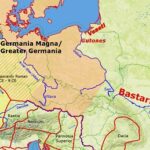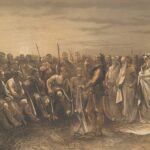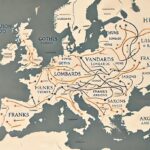 What do Roman emperors, ancient tribal alliances, and medieval power plays have in common? They all helped shape what we now know as Germany. The Early History of Germany is a riveting saga of cultural fusion, fierce independence, and geopolitical drama that laid the foundations for a modern European powerhouse. In this article, we’ll take you on a journey through Germany’s ancient past—from Germania’s tribal roots to the rise of the Holy Roman Empire. So tighten your sandals (or should we say hobnailed boots?) and prepare for a historical deep dive.
What do Roman emperors, ancient tribal alliances, and medieval power plays have in common? They all helped shape what we now know as Germany. The Early History of Germany is a riveting saga of cultural fusion, fierce independence, and geopolitical drama that laid the foundations for a modern European powerhouse. In this article, we’ll take you on a journey through Germany’s ancient past—from Germania’s tribal roots to the rise of the Holy Roman Empire. So tighten your sandals (or should we say hobnailed boots?) and prepare for a historical deep dive.
A Glimpse into the Early History of Germany
The story of Germany doesn’t start with the fall of the Berlin Wall or even the unification of 1871—it stretches back to ancient times. Before Germany was “Germany,” it was Germania—a vast region teeming with independent tribes like the Cherusci, Suebi, and Alemanni. These groups were known for their warrior culture, resistance to Roman conquest, and fierce independence.
Julius Caesar was one of the first outsiders to document these tribes, calling the land across the Rhine “barbaric” yet fascinating. The Battle of the Teutoburg Forest in 9 CE, where Germanic tribes ambushed and annihilated three Roman legions, became a defining moment in Roman-Germanic relations. This marked the Rhine as a de facto boundary for the Roman Empire and cemented the idea of Germany as a land apart—culturally and politically.
Over time, these tribal confederations evolved, and by the early Middle Ages, they laid the groundwork for what would become the Frankish Kingdom and eventually the Holy Roman Empire. The roots of Germany’s federalist tendencies can be traced all the way back to these early divisions and alliances.
Tribal Foundations and Roman Encounters
The World of Germania
Long before Germany had borders or beer halls, it was a patchwork of tribal lands. The Germanic tribes spoke related languages but were fiercely autonomous. Their loyalty lay with their kin and local chieftains, not any central authority. These groups had rich oral traditions, warrior codes, and spiritual ties to nature, forests, and ancient deities like Wodan and Donar.
The Roman Frontier
The Romans saw both opportunity and threat in Germania. They built fortified towns, trade routes, and defensive lines like the Limes Germanicus. Roman cities such as Cologne (then Colonia Claudia Ara Agrippinensium) still bear the architectural and cultural fingerprints of this era. But while Rome brought roads and wine, it never managed to conquer the German heartland—a testament to the tribes’ tenacity.
Rise of the Franks and the Holy Roman Empire
By the 5th century, the Western Roman Empire was in decline, and Germanic tribes surged into power vacuums across Europe. The Franks, under leaders like Clovis and later Charlemagne, united swaths of land into the Carolingian Empire. Charlemagne’s coronation as “Emperor of the Romans” in 800 CE symbolized the birth of a new Christian, Germanic-European identity.
This empire eventually fragmented, giving rise to the Holy Roman Empire—a decentralized realm often described as “neither holy, nor Roman, nor an empire,” but undeniably foundational to German history.
Cultural Legacies and Modern Echoes
Even today, echoes of the early Germanic world resound through modern culture. The German language, with its strong consonants and compound words, retains deep roots in its ancient predecessors. The concept of Heimat (homeland) and regional pride also harks back to the tribal identities of old.
Visit a village festival in Bavaria or a Fasching parade in Cologne, and you’ll see how local culture still reigns supreme. These are not mere celebrations—they’re reenactments of a cultural memory that spans millennia.
For a taste of traditional dishes that go back centuries, check out our Authentic German Recipes.
Stories from the Shadows of History
Consider the tale of Arminius (Hermann the Cheruscan), the leader who masterminded the ambush in the Teutoburg Forest. Raised in Rome and trained as a soldier, he returned to Germania to lead his people to victory against the empire that taught him strategy. It’s the ultimate plot twist and a powerful symbol of dual identity—something still relevant in today’s multicultural Germany.
Or ponder how Charlemagne’s vision of a unified Christian realm evolved into the patchwork of duchies and principalities that would frustrate nation-builders for centuries. His Aachen cathedral, a blend of Carolingian and Byzantine architecture, remains a pilgrimage site and architectural gem.
Germany’s early history isn’t just a series of dates and dusty battles—it’s a living narrative of identity, resilience, and reinvention. From the tribal confederations of Germania to the imperial grandeur of Charlemagne, the building blocks of German culture are ancient, fascinating, and deeply influential.
Want to delve deeper into Germany’s cultural DNA? Explore our features on German Traditions, German Cuisine, and German Holidays for even more cultural insights!
Featured Articles:
German History Timeline Overview – A concise chronological guide to major events, from early tribes to reunification and modern Germany.
Prehistoric and Ancient Germanic Tribes – Begin with the origins of Germany’s earliest peoples, their customs, and their impact on European history.
The Origins of the Germanic Peoples – Explore the early roots of the Germanic tribes, their Indo-European ancestry, and how they came to shape Central European identity long before Roman contact.
Arminius and the Battle of the Teutoburg Forest – Discover how Arminius, a Germanic chieftain, led one of Rome’s most stunning defeats in 9 AD, forever altering the balance of power in northern Europe.
Daily Life of the Germanic Tribes – From tribal councils and warrior culture to farming practices and family roles, this article offers a glimpse into the everyday lives of early Germanic societies.
Germanic Mythology and Pagan Beliefs – A look into the gods, rituals, and worldviews of early Germanic tribes, whose myths influenced later Norse legends and modern fantasy lore.
The Migration Period (Völkerwanderung) – Trace the mass movement of Germanic tribes across Europe that reshaped the continent in late antiquity.
The Rise of the Franks – Discover how this once-small tribe evolved into a dominant political force in early medieval Germany.
Charlemagne and the Carolingian Empire – Understand the political and cultural significance of Charlemagne’s rule across German and European lands.
The Holy Roman Empire – Explore the history of the Holy Roman Empire—its origins, emperors, politics, and role in shaping medieval and modern Germany and Europe.
The Saxons and Their Conversion to Christianity – See how religion and conquest collided as Christianity spread through northern Germanic lands.
The Vikings and Their Influence on Germany – Explore the northern impact of Viking raids, trade, and cultural exchange in early medieval German territories.
The Treaty of Verdun and the Division of Charlemagne’s Empire – Explore the 843 AD agreement that created distinct political boundaries and influenced today’s Europe.
The Middle Ages in German History – An overview of the political, cultural, and religious transformations that shaped Germany from the fall of the Carolingian Empire to the dawn of the Reformation, including the rise of the Holy Roman Empire and medieval society.







